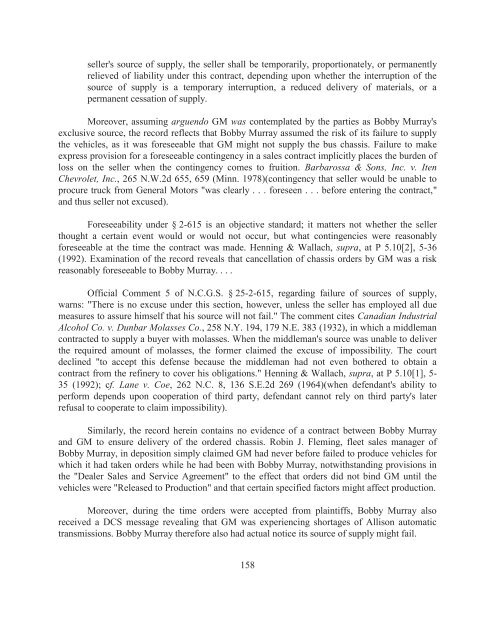Sales and Leases - A Problem-based Approach, 2016a
Sales and Leases - A Problem-based Approach, 2016a
Sales and Leases - A Problem-based Approach, 2016a
You also want an ePaper? Increase the reach of your titles
YUMPU automatically turns print PDFs into web optimized ePapers that Google loves.
seller's source of supply, the seller shall be temporarily, proportionately, or permanently<br />
relieved of liability under this contract, depending upon whether the interruption of the<br />
source of supply is a temporary interruption, a reduced delivery of materials, or a<br />
permanent cessation of supply.<br />
Moreover, assuming arguendo GM was contemplated by the parties as Bobby Murray's<br />
exclusive source, the record reflects that Bobby Murray assumed the risk of its failure to supply<br />
the vehicles, as it was foreseeable that GM might not supply the bus chassis. Failure to make<br />
express provision for a foreseeable contingency in a sales contract implicitly places the burden of<br />
loss on the seller when the contingency comes to fruition. Barbarossa & Sons, Inc. v. Iten<br />
Chevrolet, Inc., 265 N.W.2d 655, 659 (Minn. 1978)(contingency that seller would be unable to<br />
procure truck from General Motors "was clearly . . . foreseen . . . before entering the contract,"<br />
<strong>and</strong> thus seller not excused).<br />
Foreseeability under § 2-615 is an objective st<strong>and</strong>ard; it matters not whether the seller<br />
thought a certain event would or would not occur, but what contingencies were reasonably<br />
foreseeable at the time the contract was made. Henning & Wallach, supra, at P 5.10[2], 5-36<br />
(1992). Examination of the record reveals that cancellation of chassis orders by GM was a risk<br />
reasonably foreseeable to Bobby Murray. . . .<br />
Official Comment 5 of N.C.G.S. § 25-2-615, regarding failure of sources of supply,<br />
warns: "There is no excuse under this section, however, unless the seller has employed all due<br />
measures to assure himself that his source will not fail." The comment cites Canadian Industrial<br />
Alcohol Co. v. Dunbar Molasses Co., 258 N.Y. 194, 179 N.E. 383 (1932), in which a middleman<br />
contracted to supply a buyer with molasses. When the middleman's source was unable to deliver<br />
the required amount of molasses, the former claimed the excuse of impossibility. The court<br />
declined "to accept this defense because the middleman had not even bothered to obtain a<br />
contract from the refinery to cover his obligations." Henning & Wallach, supra, at P 5.10[1], 5-<br />
35 (1992); cf. Lane v. Coe, 262 N.C. 8, 136 S.E.2d 269 (1964)(when defendant's ability to<br />
perform depends upon cooperation of third party, defendant cannot rely on third party's later<br />
refusal to cooperate to claim impossibility).<br />
Similarly, the record herein contains no evidence of a contract between Bobby Murray<br />
<strong>and</strong> GM to ensure delivery of the ordered chassis. Robin J. Fleming, fleet sales manager of<br />
Bobby Murray, in deposition simply claimed GM had never before failed to produce vehicles for<br />
which it had taken orders while he had been with Bobby Murray, notwithst<strong>and</strong>ing provisions in<br />
the "Dealer <strong>Sales</strong> <strong>and</strong> Service Agreement" to the effect that orders did not bind GM until the<br />
vehicles were "Released to Production" <strong>and</strong> that certain specified factors might affect production.<br />
Moreover, during the time orders were accepted from plaintiffs, Bobby Murray also<br />
received a DCS message revealing that GM was experiencing shortages of Allison automatic<br />
transmissions. Bobby Murray therefore also had actual notice its source of supply might fail.<br />
158


















